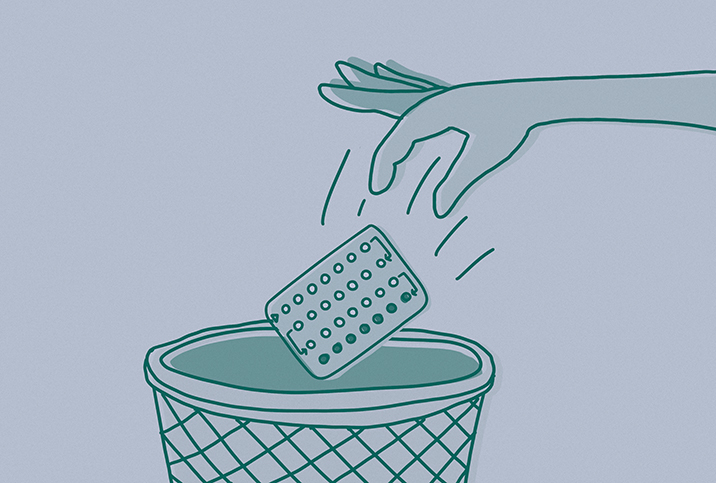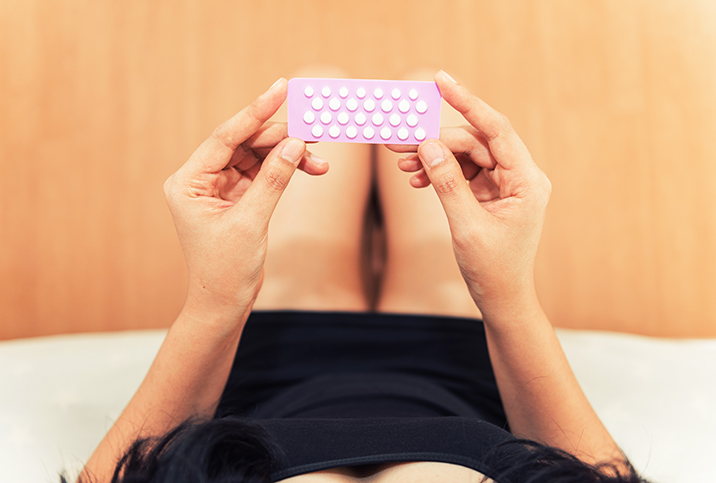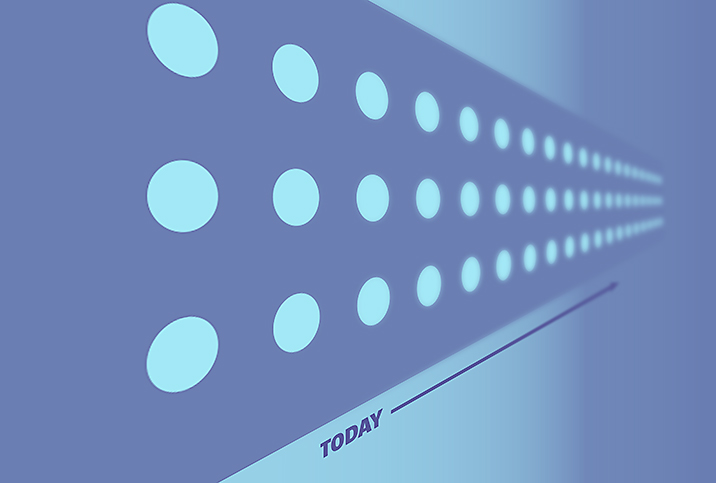No, You Don't Need a Hormone Detox

Exploitive holistic medical gimmicks thrive off vagueness: indefinite descriptions in pretty bottles claiming to solve medical conditions you may have never heard of.
Don't let Instagram ads fool you: One of the latest trends—birth control cleanses—is unnecessary, according to doctors. When it comes to most detoxes and cleanses, obstetricians are adamant that relying on your body's own natural processes is best.
WTF is a birth control cleanse?
As part of what sells such products, the descriptions for these kinds of cleanses are often incredibly nonspecific, leading you to believe your body needs this special tonic to be at optimal health.
Women looking to get pregnant soon or wanting to go off the pill for other reasons, may worry about the residual synthetic hormones—and manufacturers of cleanses like these prey on those concerns.
Essentially, a birth control cleanse is a substance that claims to reset your body's natural hormonal balance by flushing out synthetic hormones provided by birth control. The problem with this "solution," however, is that a birth control cleanse has nothing to solve.
"I am incredibly dubious of anything that has the word 'detox' on it because at its core, it's saying that you don't trust your body—the body that you have been inhabiting for 20, 30, 40 years—to keep you well," said Kate White, M.D., an OB-GYN and author of the book "Your Guide to Miscarriage & Pregnancy Loss."
'There is nothing scientific or medical about a birth control cleanse. There is no need for a cleanse and zero benefit.'
"I'm not saying that there's not medical illness [and] better living through chemistry," White continued. "This idea that you have to take other things to try to rebalance is a way of saying you don't trust your brain, your liver and your kidneys to do that for you."
Nitu Bajekał, M.D., one of the first board-certified lifestyle medicine physicians in the U.K., also refutes the idea of a hormonal detoxification. "There is nothing scientific or medical about a birth control cleanse," Bajekal said. "There is no need for a cleanse and zero benefit," she continued. "The [birth control] pill washes out of your system very quickly, which is why one has to take it regularly and daily for it to be effective. The whole idea of detoxing and sweating out toxins is a myth that needs to be debunked and has no scientific or evidence-based origin."
Let those words ring in your head next time your thumb is poised above an Instagram ad for some celebrity-backed "cleansing" tonic.
Relying on your body's natural processes
Besides the Depo-Provera contraceptive shot (which can take 15 weeks), hormonal birth controls leave the system in about 36 hours. Not only is that fairly swift, it raises the question of what we feel is so pressing about synthetic hormones it has to be expunged from our bodies.
Sara Twogood, M.D., a board-certified OB-GYN and head of Female Health Education, calls for a paradigm shift in what is deemed a toxin. "I don't look at hormonal contraceptive as a 'toxin.' It was doing a specific job (oftentimes that job is contraception, but hormonal contraception also helps troubleshoot other symptoms, as well)."
Twogood notes that in some cases, coming off birth control can cause symptoms—but no cleanse will help. "The body's natural production of hormones occurs in a feedback loop—different hormones communicating with one another in different parts of the body," she explained. "Sometimes it can take a bit of time for the body to start communicating [with] itself again. This isn't hastened by a 'detox,' though."
What symptoms can be expected? Wacky cycles, weight fluctuations, acne, an increase in libido—and, of course, the possibility of pregnancy—are normal in the weeks post-birth control.
"The first period after stopping the pill is known as a 'withdrawal bleed,' and you should allow up to three months for your natural menstrual cycle to fully reestablish itself," Bajekal said. "Some people may experience initial side effects, such as bloating and nausea, which almost always settle down within a few weeks as their body readjusts to its own baseline."
The limited impact of synthetic hormones
Perhaps because of the vagueness of the term "hormonal cleanse" (which hormones specifically are being cleansed?), it's easy for the lay-menstruator to lose sight of which hormones exactly are being impacted by hormonal birth control.
Twogood emphasized that the hormonal reach of oral contraceptives is limited. "The main hormones of the menstrual cycle can be affected—that includes FSH (follicle-stimulating hormone), LH (luteinizing hormone), in addition to estrogen and progesterone."
FSH controls the growth of eggs and increases estrogen production, while LH stimulates the release of those eggs. Basically, the hormones impacted are those analogous to the sexual hormones you already knew were being impacted (estrogen and progesterone).
"Taking estrogen and progesterone as part of birth control does not affect the other hormones in your body—it just doesn't," White said. "It doesn't affect the thyroid or the pituitary hormones. It does affect testosterone because it does affect your sex hormone-binding globulin, which binds up to testosterone." This is why skin tends to get better when someone is on birth control, White added, because "there's less testosterone around."
"The other hormones in your body, [such as] cortisol, those aren't affected at all," White continued. "The ripples tend to end with your gonads."
Of the 26 hormones identified within the human body, the vast majority are untouched by hormonal birth control.
The dangers of a detox
Not only is a hormonal detox unnecessary and potentially dehydrating, but there is also no solid information on the possible risks. No formal research has been done on these products, and doctors advise menstruators to stay away.
Many detox products contain chasteberry, an herbal supplement. Chasteberry has not been sufficiently studied, but known side effects include nausea, itching, headaches and stomach pain. The supplement (like many others) can negatively interact with other medications.
Other common ingredients include vitamins C and E, selenium and magnesium. While these supplements may not be harmful, they're not going to flush out any harmful toxins, either.
The underlying problem beyond the ingredients, according to White, is that we think there's a problem to fix.
"There is this feeling that birth control must be bad and must be wrong," White said. "All these messages we get are all going back to the source of it is unnatural for a menstruator to be controlling their fertility with hormones. We have this thought process around birth control [and not] for other classes of medications." "It's not so much having to chase down why estrogen and progestin don't affect the hormones in your body," she continued. "It's why would you even think that they would? You know, it's because of fear around the hormones, which I really do think goes back to control over fertility."
Perhaps it's a mentality that managing fertility through birth control is akin to defying gravity or controlling other natural processes—but that carries an underlying misogynistic concept that a person isn't entitled to bodily autonomy. Don't let an ad on social media or a pretty-colored bottle leave you questioning your own body. According to doctors, there's no cause.


















